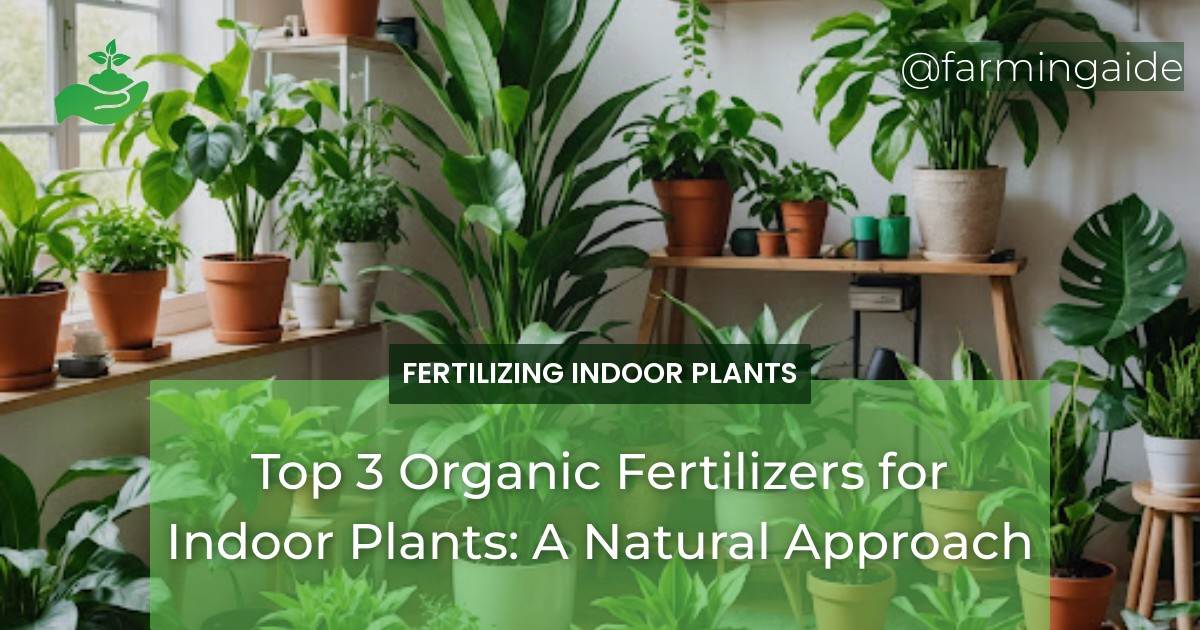As an indoor plant enthusiast, you understand the importance of providing your plants with the necessary nutrients for optimal growth and health. While synthetic fertilizers may seem like a convenient option, they can have detrimental effects on the environment and your plants’ well-being. That’s why turning to organic fertilizers is a natural and sustainable approach to indoor plant care. In this article, we’ll delve into the world of organic fertilizers, exploring the top 3 options for indoor plants, their benefits, and how to use them effectively.
Key Takeaways
- Organic fertilizers are a natural and sustainable approach to indoor plant care.
- The top 3 organic fertilizers for indoor plants are compost tea, worm castings, and seaweed fertilizer.
- Organic fertilizers promote healthy plant growth, improve soil structure, and reduce environmental harm.
- Proper application and frequency of use are crucial for optimal results.
- Comparing synthetic vs. organic fertilizers reveals significant benefits for the environment and plant health.
Introduction to Organic Fertilizers
Organic fertilizers are derived from natural sources, such as animal waste, plants, and microorganisms. These eco-friendly alternatives to synthetic fertilizers provide plants with the necessary nutrients while promoting a healthy soil ecosystem. By choosing organic fertilizers, you’re not only nurturing your plants but also contributing to a more sustainable future.
In contrast to synthetic fertilizers, organic fertilizers release nutrients slowly, providing a steady supply of nutrients to plants. This slow-release mechanism ensures that plants absorb the necessary nutrients without overdosing, reducing the risk of nutrient burn and environmental pollution.
Benefits of Organic Fertilizers
Organic fertilizers offer a multitude of benefits for indoor plants and the environment. Some of the advantages include:
- Improved soil structure and fertility
- Enhanced plant growth and health
- Increased resistance to diseases and pests
- Reduced environmental impact and pollution
- Promotion of beneficial microorganisms in the soil
How Organic Fertilizers Work
Organic fertilizers work by providing plants with the necessary nutrients, which are then absorbed through the roots. As these nutrients are released, they stimulate beneficial microorganisms in the soil, creating a thriving ecosystem. This symbiotic relationship between plants, microorganisms, and the soil promotes healthy plant growth, increases soil fertility, and reduces the risk of nutrient deficiencies.
In addition to providing essential nutrients, organic fertilizers can also improve soil structure, increase water retention, and reduce soil compaction. This results in a more resilient soil ecosystem, capable of withstanding environmental stressors and supporting plant growth.
Top 3 Organic Fertilizers for Indoor Plants
Now that we’ve explored the benefits of organic fertilizers, let’s dive into the top 3 options for indoor plants:
ALSO READ
Compost Tea
Compost tea is a liquid solution made by steeping compost in water. This nutrient-rich fertilizer promotes beneficial microorganisms, stimulates plant growth, and improves soil structure. Compost tea is an excellent option for indoor plants, as it provides a slow release of nutrients and encourages healthy microbial activity.
To make compost tea, combine 1 part compost with 10 parts water and let it steep for 24-48 hours. Strain the liquid and use it as a fertilizer, taking care to dilute it according to the manufacturer’s instructions.
Worm Castings
Worm castings, also known as vermicompost, are the nutrient-rich waste products of worms. These natural fertilizers are packed with microbes, nutrients, and humic acids, making them an excellent choice for indoor plants. Worm castings improve soil structure, increase water retention, and provide a slow release of nutrients.
To use worm castings, mix 1 part castings with 10 parts potting soil or use them as a top dressing around your plants. Be sure to follow the manufacturer’s instructions for optimal results.
ALSO READ
Seaweed Fertilizer
Seaweed fertilizer is derived from various types of seaweed, which are rich in micronutrients, macronutrients, and plant growth promoters. This natural fertilizer stimulates plant growth, increases resistance to diseases, and promotes healthy soil microorganisms. Seaweed fertilizer is an excellent option for indoor plants, as it provides a slow release of nutrients and improves soil fertility.
To use seaweed fertilizer, follow the manufacturer’s instructions for application rates and frequencies. Typically, you’ll mix the fertilizer with water according to the instructions and apply it to your plants as needed.
How to Use Organic Fertilizers
Now that we’ve explored the top 3 organic fertilizers for indoor plants, let’s discuss how to use them effectively:
Application Methods
There are several ways to apply organic fertilizers, including:
- Soil drench: Mix the fertilizer with water and apply it to the soil.
- Foliar spray: Mix the fertilizer with water and spray it directly on the leaves.
- Top dressing: Apply the fertilizer to the soil surface around your plants.
Frequency of Use
The frequency of use for organic fertilizers depends on the type of fertilizer, plant type, and growth stage. As a general rule, start with a small dose and gradually increase as needed. Be sure to follow the manufacturer’s instructions and monitor your plants’ response to the fertilizer.
Comparing Synthetic vs. Organic Fertilizers
When it comes to choosing between synthetic and organic fertilizers, the benefits of organic fertilizers are clear:
Environmental Impact
Synthetic fertilizers can contaminate soil, air, and water, contributing to environmental pollution and harm to beneficial microorganisms. Organic fertilizers, on the other hand, promote a healthy soil ecosystem and reduce the risk of environmental harm.
Plant Health Benefits
Organic fertilizers provide a slow release of nutrients, reducing the risk of nutrient burn and promoting healthy plant growth. Synthetic fertilizers, however, can cause rapid growth, leading to weak and leggy plants.
Conclusion and Final Thoughts
In conclusion, organic fertilizers offer a natural and sustainable approach to indoor plant care. By choosing compost tea, worm castings, or seaweed fertilizer, you’re not only nurturing your plants but also contributing to a more eco-friendly future. Remember to follow the manufacturer’s instructions, start with small doses, and monitor your plants’ response to the fertilizer. With the right approach, you can create a thriving indoor garden that benefits both your plants and the environment.


